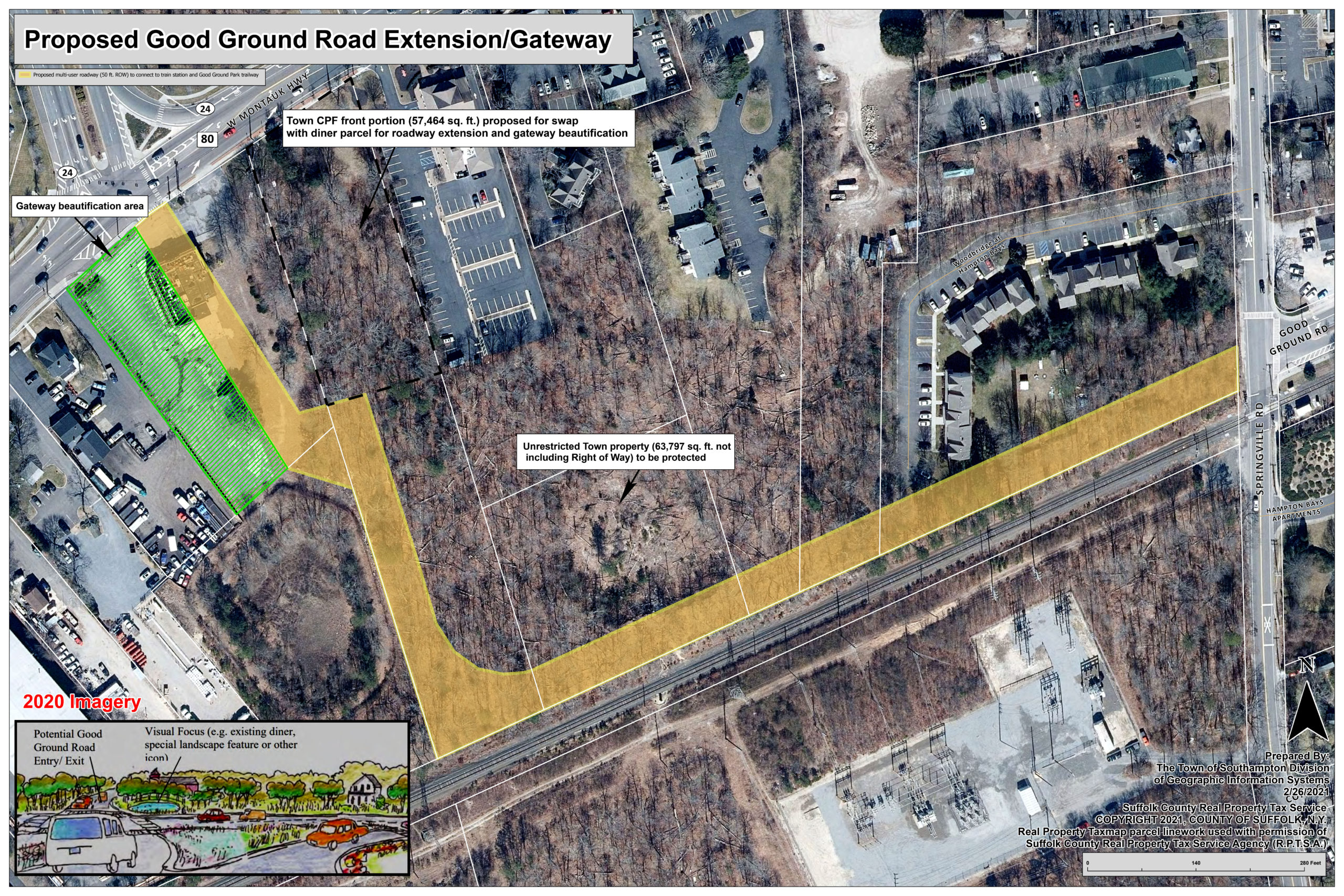
How does downtown Hampton Bays spell relief? If a long-aborning traffic remediation scheme comes to fruition, the aid will be spelled “Good Ground Road Extension.”
The idea of a new, secondary road designed to funnel traffic away from the hamlet’s main business district is not a new one, Town Planning and Development Administrator Janice Scherer said during a Town Board work session discussion on February 25. An western extension to Good Ground Road, which runs parallel to Montauk Highway along the Long Island Rail Road tracks, is suggested in hamlet land use plans dating back almost a decade.
The new road, described by Supervisor Jay Schneiderman as “a relief valve,” would be a continuation of Good Ground Road at its western terminus. It would cross Springville Road and run along the railroad tracks south of the Woodbridge townhouse development, then turn north and run to the existing traffic light at the end of State Route 24.
It lines up with the light “smack in the middle of the diner,” Ms. Scherer said. The diner, which has been vacant for years, would be torn down.
The plan calls for a three-way land swap. The diner property would shift eastward, and the eastward property would swap south.
According to Ms. Scherer, the land fronting Montauk Highway located between 149 West Montauk Highway, now Salvatore’s restaurant, and 157 West Montauk Highway, the diner, was purchased with money from the Community Preservation Fund as green space, while property to the south located along the LIRR was purchased with general funds for municipal use.
To accommodate the diner move, the southerly parcel, the land purchased for general municipal use, would have to become the greenspace. CPF law is very strict when it comes to removing the open space use from a piece of property, town CPF Manager Lisa Kombink explained. To “alienate” the parkland, other, comparable land must be offered to take its place. Mr. Schneiderman reckoned the southern property was of similar environmental value as the Montauk Highway frontage. It’s somewhat larger.
Beyond finding a land stand-in, CPF law requires an act of the State Legislature to allow for the change of use or transfer of CPF properties. Mr. Schneiderman said he’d discussed the initiative with Assemblyman Fred W. Thiele Jr., who would be carrying the bill to Albany.
“I plan to introduce the bill in the next week or so,” Mr. Thiele said Thursday.
The ownership of parkland is covered by something called “The Public Trust Doctrine,” he explained.
“In short, parkland is held in public trust and there can be no net loss of parkland,” he said. “These bills require substitute lands to replace any parkland that is alienated. The land to be substituted must be at least of equal size, equal market value, and equal quality to the property being alienated. If they can meet that test, the outlook for the legislation is good.”
The lawmaker said the legislature considers several similar bills across the state each year.
Finally, the swap requires a referendum, with a ballot proposition up for a townwide vote.
Joseph Vona, who represents the owners of the diner, Montauk 24 Realty LLC, confirmed, “We have been working for a long time now with the town to try to see if we could come up with something to keep their vision of that road alive.”
If the swaps take place, Councilwoman Julie Lofstad wanted to assure residents that there will still be a place for community signs and a “Welcome to Hampton Bays” gateway area. Property to the west of the new road, currently located between the diner and Rapid Recovery Towing, would be ripe for beautification signs and plantings for a reclaimed vegetative entrance to the hamlet.
The supervisor said, “I think this is a creative solution that allows the commercial property to be viable.” The new configuration would put the diner property on a corner, and its zoning designation would bleed over to the new site. It was noted the road design would allow for a connection from Salvatore’s to Good Ground Road Extension. That would be “a great advantage” for customers looking to get to Flanders Road from the restaurant, the supervisor observed.
In all, Mr. Schneiderman felt a secondary road, one that allows people trying to get to the hamlet’s residential areas without snaking through the business center, would be “a real relief valve.”
“This is really, I think, an elegant solution, that is business friendly, in terms of cooperating with the owners of the diner property. We end up with more green space than we currently have, we get a logical road and we get a relief valve that I think is going to be increasingly more critical as time progresses,” Mr. Schneiderman said.
The supervisor next wants to run the concept past local community groups. Councilman Rick Martel noted that he was a guest of the Hampton Bays Civic Association earlier in the week. When the topic arose, “Nobody was surprised,” he said.
The road has been on people’s minds for years,and while some were sad at the thought of losing the diner, “the icon,” Mr. Martel said, “I think we’ve all kind of consoled ourselves to the fact that that’s probably going to happen and the alternative could be a lot worse.” The supervisor noted the diner, which has been vacant for a number of years, would have to be torn down if any entrepreneur wants to start any business there.
The supervisor said he wanted to move ahead to get a ballot proposition ready and let the public decide.
“Obviously it’s not gonna be cheap to build,” he predicted. “But I think it’s important to have this road. Otherwise, we’ll continue to have downtown congestion … If you’re just trying to get home, it’ll make a big difference.”